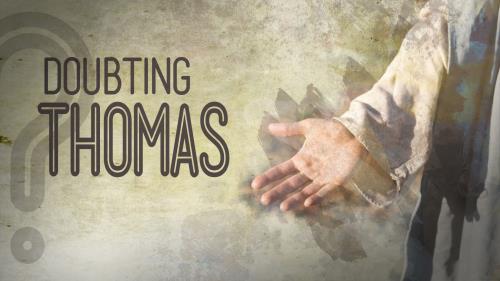-
The Good News At The End Series
Contributed by Lori Broschat on Mar 22, 2012 (message contributor)
Summary: Finishing out the third section of the Apostle's Creed
THE GOOD NEWS AT THE END
A children’s catechism class was learning the Apostles Creed. Each child had been assigned a sentence to repeat. The first one said, “I believe in God the Father Almighty, maker of heaven and earth.” The second child said, “I believe in Jesus Christ, His only Son…” When he had completed his sentence, there was an embarrassing silence. Finally, one child piped up, “Teacher, the boy who believes in the Holy Spirit isn’t here.”
Last, but not least, the Apostle’s Creed gets to the Holy Spirit, but mentions only that we believe in the Holy Spirit without listing any of His attributes. It might be difficult to make the connection between the Holy Spirit and the five phrases that conclude this creed. The key to the connection is empowerment. The Holy Spirit is God’s authority within the church and so empowers believers not only for mission, but equips us with gifts for service and provides us with the promise of what is to come.
Jesus told His disciples that acting as a counselor; the Holy Spirit would guide them – and us – into all truth. On Pentecost when they received the Holy Spirit they were then able to accept and process all the information they had received from Jesus while they were with Him. Without the Holy Spirit they did not have the necessary clarity to understand. The Holy Spirit is the driving force behind the church, the one who keeps all things running and according to plan.
Besides that, the Holy Spirit convicts us of sin before we are even aware of our need for Christ. Without the prompting of the Spirit, you would not be able to be a Christian, and as a Christian you should pray to receive the fullness of the Holy Spirit. It is the Spirit dwelling within us that creates real Christian community. Just using the name Christian or gathering in a church does not make for Christian community.
Because we should always think in terms of Christian community, it requires a bit of explanation as to why the next line of this creed is about our belief in the holy catholic church. Some churches substitute Christian for catholic, but the meaning is the same. This word means universal and when used with a small c indicates all of Christ’s followers of all denominations. In other words, the entire family of believers around the world. We are not primarily Methodist or Lutheran or Baptist – we are Christians.
The church is a living, breathing reality. When we say we believe in the church we don’t mean we believe in a building or a place to meet. We believe in what the Holy Spirit empowers and guides and directs into ministry. Since we call ourselves holy we know that we are set apart for service to God in the world but not of the world. Part of what keeps us set apart is the communion of saints. This is not in reference to the sacrament, but rather a relationship. We commune with each other; we commune with all the saints past, present and future because of our common connection in Christ and our common confession of Him. We hold that in common and it connects us to each other.
Just look at the book of Acts to see what the early church and how interconnected they were. They ate together, the met together for study of God’s word, they shared what they had to provide for others, they worshiped together every day. Never once is a committee mentioned – a group of deacons perhaps, but no committees. I fear that is a more contemporary device born of necessity. But even so, we are a communion of saints as well as sinners, and as such, we may not believe that we are saints. That word is usually reserved for those who have lived extraordinary lives and are honored after death.
The hymn “The Church’s One Foundation” speaks of the communion that the saints of the past and those still living share with the Trinity: “Yet she on earth hath union With God the Three in One, And mystic sweet communion With those whose rest is won, With all her sons and daughters Who, by the Master’s hand Led through the deathly waters, Repose in Eden land.” A saint is anyone who has believed in Jesus and lived an obedient life in anticipation of eternity with God.
The next line of the creed places part of our anticipation of eternity front and center. We believe in the forgiveness of sins. This is a biggie. If we don’t believe in this we are in trouble. Forgiveness is at the heart of the crucifixion. In the Old Testament God gave His people a set of commandments to obey and a sacrificial system to atone for their sins when they didn’t obey. The Old Testament understanding of forgiveness as pardon for rebellion, symbolized by tablets of stone and the heavy veil that separated the holy of holies from the worshipper. These are external things.

 Sermon Central
Sermon Central



